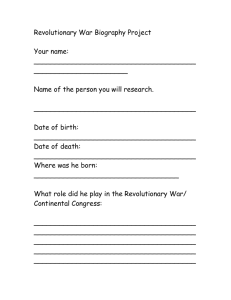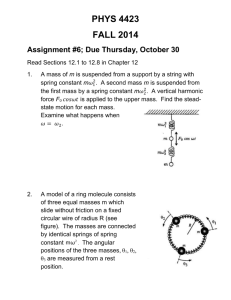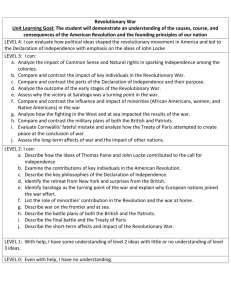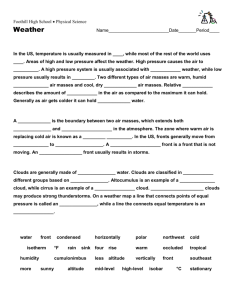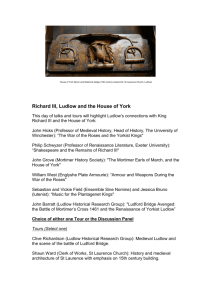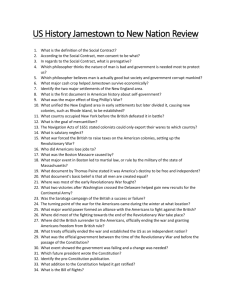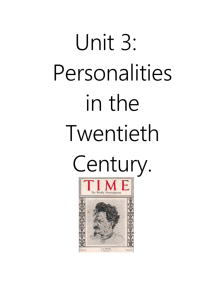The struggle against war, and the Ludlow amendment
advertisement
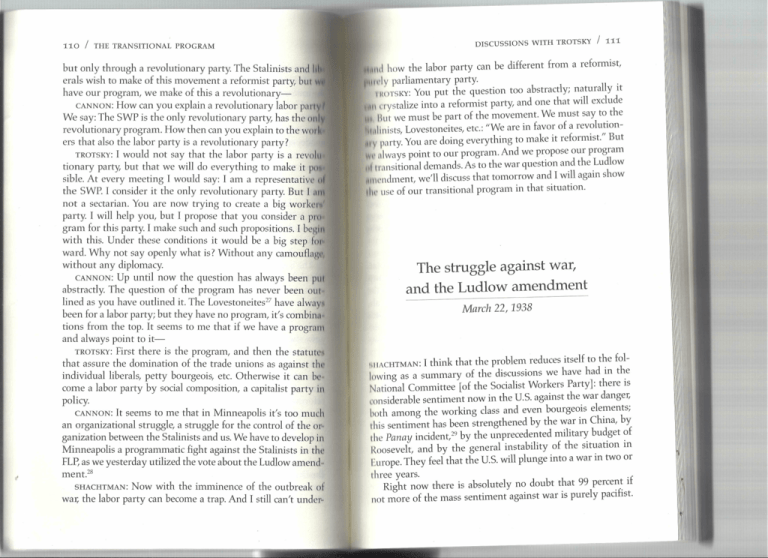
110 / THETRANSITIONALPROGRAM but only through a revolutionary party The Stalinists and Illl erals wish to make of this movement a reformist party, bUI have our program, we make of this a revolutionaryCANNON:How can you explain a revolutionary labor pun We say: The SWP is the only revolutionary party, has the 0111 revolutionary program. How then can you explain to the wm I ers that also the labor party is a revolutionary party? TROTSKY:I would not say that the labor party is a revolu tionary party, but that we will do everything to make it po sible. At every meeting I would say: I am a representative Ilf the SWP. I consider it the only revolutionary party But I 011 not a sectarian. You are now trying to create a big workei party I will help you, but I propose that you consider a pili gram for this party I make such and such propositions. I bellll' with this. Under these conditions it would be a big step (III ward. Why not say openly what is? Without any camouflage without any diplomacy. CANNON:Up until now the question has always been pili abstractly. The question of the program has never been out lined as you have outlined it. The Lovestoneites" have alwa been for a labor party; but they have no program, it's cornbinn tions from the top. It seems to me that if we have a progrolll and always point to itTROTSKY:First there is the program, and then the statute that assure the domination of the trade unions as against till' individual liberals, petty bourgeois, etc. Otherwise it can be come a labor party by social composition, a capitalist party ill policy CANNON:It seems to me that in Minneapolis it's too much an organizational struggle, a struggle for the control of the ganization between the Stalinists and us. We have to develop ill Minneapolis a programmatic fight against the Stalinists in th(,· FLp, as we yesterday utilized the vote about the Ludlow amendmerit." SHACHTMAN:Now with the imminence of the outbreak of war; the labor party can become a trap. And I still can't under- DISCUSSIONSWITH TROTSKY/ 111 Illld how the labor party can be different from a reformist, tllI.ly parliamentary party IIHlTSKY:You put the question too abstractly; naturally it 1\ \"'ystalize into a reformist party, and one that will exclude Ilut we must be part of the movement. We must say to the IIIllnists, Lovestoneites, etc.: "We are in favor of a revolution'V party You are doing everything to make it reformist." But " nlways point to our program. And we propose our program " 11'0 nsitional demands. As to the war question and the Ludlow IlIll'ndment, we'll discuss that tomorrow and I will again show 1111' Liseof our transitional program in that situation. The struggle against war, and the Ludlow amendment March 22, 1938 IIACHTMAN:I think that the problem reduces itself to the following as a summary of the discussions we have had in the National Committee [of the Socialist Workers Party]: there is ronsiderable sentiment now in the U.S. against the war danger, both among the working class and even bourgeois elements; Ihis sentiment has been strengthened by the war in China, by the Panay incident,29 by the unprecedented military budget of Roosevelt, and by the general instability of the situation in I~urope. They feel that the U.S. will plunge into a war in two or three years. Right now there is absolutely no doubt that 99 percent if not more of the mass sentiment against war is purely pacifist. WITHTROTSKY/ 1.1.3 DISCUSSIONS 112 / THETRANSITIONAL PROGRAM \ h kers we didn't; h had t e spea , d h other way, for t ey to speak. That is perfectly understandable. A revolutionary position 1111 'eere t e be a sponsor but was not h' try to speak. the war is confined to a very small circle of radicals and Ml11\ ~ochran w~sT~ 's not settled yet-we t~ld im tOll the Loveists. Our problem is to put forward in practice our basic revoln CANNON. ~~ut I don't think he WIll. Fon~~e~ tionary proletarian position toward the war, in contrast to till SH~CHTM~~' cialists do not hav~ spe~kers ert ber of miniO general pacifist agitation, and at the same time to participate III ItonelteS an d rogram on war m whlCh.a n:~ se den'lands a broader antiwar movement, which means at the present tilill We adoPt~ a:e put forward. On the bas~ 0 td ein the trade to participate in a movement which is, if not fundamentally ~lUlndeman s atandard resolution to be a opte then predominantly, pacifist, even nationally patriotic. The SI' we.drew ul : ~e circulated ever!':here. d I don't think that t [Socialist Party] and the Lovestoneites have now made a COlli \lmons an .' . extremely dlfhcult, an h d. nd there is .. 1 b . h 11 . The pOSlUOn IS ,a bination and lave esta hshed what t ey ca a Keep Ameri.n . uite clearly t h roug h to teen 1d s movement Out of War Committee. Substantially, it is the same as the old any of us sees hIttq'n J'Ulnping into a so-calle .mas y education . danger tal h evo uuonar Munzenberg movement-the League Against War,30 etc.-ex .great. 'fl'st in nature-t e r . e not to en. t war-pacl d A he same um , cept that the programmatic declaration of this Keep Amerim agalns d will be neglecte. ~ t. 0 aganda posiOut of War Committee is far to the right of the Miinzenbcrg of the vanguar t leaves us still mamly in a pr p h movemen movement. ter tee already ac. dent you ar TROTSKY: Who are the leaders of this committee? non.. the Ludlow amen rn d t d and those Th dIspute on 1 ti ons a op e SHACHTMAN: Norman Thomas, Lovestone, and Homer Mal' . e . h You have seen me mo 1 tin" spoke for them, but I don't know whether Martin is a mem qUalnted 4Wlt . . it came into . . . d3 f h' mmlttee, 1 ber of the committee. He made an antiwar speech, but at tlw reJecte. . On the question 0 t IS ~o . d couple of dozen same time a patriotic speech. They have a few retired generals, CANNON.hi way Norman Thomas m:71te h are in favor of who are isolationists. How far this movement will develop it i~ ~xi~t~nce In t ~iS ho~se-writers, old ;:dle~ w 0one of us. Oak ldua difficult to say. So far it remains in the hands of this commit mdlV s to ires and Liston Oak ~ utd~ They decided . . . . Lovestonel , h eJecte It. tee; It IS not based upon any orgaruzanon. They are now plan. peace, d h be invited, but t ey r 11 re to speakte t at we L Fo ettewe es ning a national congress. sugg .' n which such men as aId Thomas, and . . fl nameetlngl. d genera, an . k TROTSKY: Has t 1.te committee any in uence now? upo w his olicy-and a retue . Some comrades rhm SHACHTMAN: No. It reflects what the average American stands you k~~ h Peaks for the Lovestoneltes. d' d 't do it. We atfor-against war in Europe and in Asia and against sending Wolfe, w 0 ~ go into this body. But ~e 1 n f the Barbusse h troops out, but when we are attacked, we'll defend ourselves, that we. s IOU. very nature it is a cancatu~e Other states and . k d It nIts ittees In 0 etc., etc. We had, for example, ~ne concrete problem in Clevetac.e S'37They are setting up co~m n Their appeal is to the land, where we have a very active comrade, Cochran." The SP b~smes . ldi a congress in Washmgto eal to Trotsky.1 g and the Lovestoneites organized a mass meeting with Charles aim at ho m workers. LHands copy of t LeudalPPw amendment. .' ns nott h e . . the u 0 Beard'" and Homer Martin as speakers. The SP and LoveCltlZe, h 'de of the questlon IS . M' neapolis takes a . .h h 1 h h The ot er SI . . .nst It. in . stoneites approached our comrade wit t e proposa t at C . took a POSltlOn agal . 38and Cochran m .. ki h Th commIttee h t OrganIZer, become a sponsor of this meetmg. He wrote us as mg t at we e l' y in the Nort wes h endment. More 'ff rent po ic .' on team d1 e approve it. We approved it, but not very enthusiastically. Later di osed to our posltlon on in the discussions in the PC [Political Committee], the idea Clevelan IS opp h. 1111 DISCUSSIONS WITH TROTSKY / 115 114 / THE TRANSITIONAL PROGRAM or less, his position is like yours, though he didn't know of YOlII letter. The position of the committee since then is a little modi fied, but still it remains to be clarified. Then there remains till question whether we should present resolutions against war ill the trade unions. We would then introduce such a resolution ill Minneapolis and popularize it as the Minneapolis resolution. DUNNE: We already passed the resolution. CANNON: Here it is. We wish to have a careful criticism of il [Resolution is read by all present.] TROTSKY: I will begin with the Ludlow amendment as a pnK tical question which can introduce us to the general question, I believe, in a concrete way. I can't agree with the position of the NC, not with the first nor with the second, the motion pro posed by Shachtman against the motion of Burnham, and I believe Could." and adopted by the NC. When I wrote about this to Comrade Cannon in a private letter I didn't imagine <11 that time that the question would become so important in t111' life of the That is why in this letter I formulated my own position without insisting upon the necessity of reconsidering the question by the American organization. But now from the newspapers and especially from the comrades present here I learned that the question received further development and can playa very great role. This question, important in itself, is also symptomatic for our policy in general. The NC declaration states that the war cannot be stopped by a referendum. That is absolutely correct. This assertion is a part of our general attitude toward war, as an inevitable development of capitalism, and that we cannot change the nature of capitalism or abolish it by democratic means. A referendum is a democratic means, but no more and no less. In refuting th illusions of democracy we don't renounce this democracy s long as we are incapable of replacing that democracy by th institution of a workers' state. In principle I absolutely do not see any argument which can force us to change our general attitude toward democracy in this case of a referendum. But we should use this means as we use presidential elections, or the u.s. election in St. Paul; we fight energetically for our program. We say: The Ludlow referendum, like other democratic means. can't stop the criminal activities of the sixty families, who are incomparably stronger than all democratic institutions. This does not mean that I renounce democratic institutions, or the fight for the referendum, or the fight to give American citizens of the age of eighteen the right to vote. I would be in favor of our initiating a fight on this; people of eighteen are suffi.iently mature to be exploited, and thus to vote. But that's only parenthetical. Now naturally it would be better if we could immediately mobilize the workers and the poor farmers to overthrow democracy and replace it with the dictatorship of the proletariat, which is the only means of avoiding imperialist wars. But we an't do it. We see that large masses of people are looking toward democratic means to stop the war. There are two sides to this: one is totally progressive, that is, the will of the masses to stop the war of the imperialists, the lack of confidence in their own representatives. They say: Yes, we sent people to parliament [Congress], but we wish to check them in this important question, which means life and death to millions and millions of Americans. That is a thoroughly progressive step. But with this they connect illusions that they can achieve this aim only by this measure. We criticize this illusion. The NC declaration is entirely correct in criticizing this illusion. When pacifism omes from the masses it is a progressive tendency, with illusions. We can dissipate the illusions not by a priori decisions but during common action. I believe that we can say to the masses, we must say to them openly: Dear friends, our opinion is that we should establish the dictatorship of the proletariat, but you are not yet of our opinion. You believe you can keep America out of war by a referendum. What will you do? You say you do not have enough confidence in the president and the Congress elected by you and that you wish to check them through a referendum. Good, very good, we absolutely agree with you that you must learn DISCUSSIONS WITH TROTSKY / 117 '116 / THE TRANSITIONAL PROGRAM to decide for yourselves. The referendum in this sense is a VI'! good thing, and we will support it. Ludlow proposed this ameiu] ment but he will not fight for it. He does not belong to III sixty families, but he belongs to the five hundred families. II launched this parliamentary slogan, but this is a very sew I fight and can be conducted only by workers, farmers, and I II masses-and we will fight with you. The people who proposul these means are not willing to fight for it. We say this to you III advance. Then we become by and by the champions of this fight. At every favorable occasion we say: This is not sufficient; the 1110/\ nates of the war industry have their connections, etc., etc.; WI' must check them also; we must establish workers' control ()I war industry. But on the basis of this fight in the trade union we become the champions of this movement. We can say it' almost a rule. We must advance with the masses, and not on Iy repeat our formulas but speak in a manner that our slogam become understandable to the masses. The greatest historical example is the example of the Rus sian Bolshevik Party." I will repeat it because it is significant. From the beginning of this century until 1917-for almost twenty years-we were fighting against the so-called Social Revolutionaries or Populists." Their propaganda was for the expropriation of the soil and its partition into equal lots. W, denounced this program as utopian. We declared that under capitalism it is impossible and under socialism it is not a question of partition but of collectivization. The fight lasted for almost twenty years. It took theoretical form in 1883 with the creation of the first Marxist intellectual groups of Plekhanov and Axelrod." and it became very acute in this century. The most important line of demarcation was the line of the agrarian program. In 1917 the peasants adopted the program of the SRs-many congresses adopted this program: expropriation of the soil and partition into equal lots among the peasants. What did we do in this situation? We declared: You will not adopt our program. Instead you adopted the program of the SRs. That hns two parts: the expropriation of the soil, which is an absolutcly progressive step; but the other part-the partition into \'ljuallots-is absolutely utopian. But you wish to go through (his experience. We are ready to take it [this step] with you. But we say to you in advance that the SRs are incapable of realizing Iheir own program. That they are petty bourgeois and thus dependent upon the big bourgeoisie. This is not our program, but we will help you realize it, this program which is compli- co ted by illusions. The situation is now different-it is not a revolutionary situution. But the question can become decisive. The referendum is not our program, but it's a clear step forward; the masses show that they wish to control their Washington representatives. We say: It's a progressive step that you wish to control your repreentatives. But you: have illusions and we will criticize them. At the same time we will help you realize your program. The sponSOl' of the program will betray you as the SRs betrayed the Russian peasants. The last motion of the NC on this question is not correct: that we will vote for the Ludlow amendment in cases where it is necessary to assure it a majority against the Stalinists-excuse me, but that's absolutely bureaucratic. How can you at a mass meeting say, "We will stand aside and see how the vote goes"? That's incomprehensible to the masses. We must become the champions of the movement. We must publish leaflets and explain our full position. At trade union meetings and at farmers' meetings we must say that we are the real champions of the movement. But this movement, like the question of the labor party must be connected with a concrete program, opposing the program of the Lovestoneite- Thomasites. I absolutely agree that we should have nothing to do with the Keep America Out of War Committee. But also on this question we cannot remain in inactive opposition. We must study their program and criticize it. In this case the most comprehensible, progressive, and revolutionary slogan is the workers' control of military industry, since everybody knows that they instigate 118 / THE TRANSITIONAL PROGRAM war. We say: Workers, you are developing the industry no! III the advance of the fatherland but for the war patriots. COJ)11111 of the war industry is part of the control of industry in genom] [Quotes from leaflet issued by Keep America Out of Will Committee and continues:] This is not an American question, as this states, it is a w(111 ers' question. I believe that we must also consider the sloglill that we are not, naturally, opposed to a war against conquer ors-but it has to be conducted by an army of workers [lild farmers under the control of the trade unions, under a govcui ment of workers and farmers. Such an army would not hav. imperialist aims, but if it were attacked, etc., ete. This progralll [points to above leaflet] must be considered concretely We point out that it is not a question of "American cooperation for inter national peace" but cooperation of the American working cia with the workers of the other countries for peace. I come bad to our transitional slogan, control of war industry and possibl the expropriation of the sixty families, beginning with the propriation of war industries. Do you think that the trade union program should have a point in favor of the Ludlow amendment? Then I b lieve also that if we cannot directly launch expropriation of wa I' industries, then at least workers' control of war industries. TROTSKY: These people [pointing to leaflet] are not even good pacifists. They say: We do not want any increase in the army, in armaments. And what exists, is that then all right? We say that this army that exists is an army against the workers and for war. If they were genuine pacifists they would at least say: Abolish the army CANNON: We wish to change the character of the army-that the workers and farmers be armed, that they get a military education under the control of the trade unions-that's not pacifist. We say workers' control of war industry as a step toward expropriation-that's not pacifism. CANNON: What do you mean by the workers' and farmers' government? DISCUSSIONS WITH TROTSKY / 119 TROTSKY: It can be considered from two points of view: as a post chapter in the history of America it can be discussed only hypothetically, and as a chapter in the education of the masses. I.arge masses will understand it in a democratic parliamentary .nse. but we will try to explain it in a revolutionary sense. But 19ain we will say: You can't accept it as a dictatorship of the proletariat and poor farmers. You wish to put on the ballot work.rs' and farmers' candidates. We will help you. If these candidates are elected and they are the majority, will we take responsibility for their program? No, no, their program is not sufficient. Here is our program. In the Congress we will remain a minority Then we begin to underline the necessity not only of independent candidates but of candidates with a prosram. It is very possible that under our influence and under the influence of other factors there comes to be a government of John Lewis, La Follette, and La Guardia, and they will name it a labor-farmer government. We will then oppose it with all vigor. In 1917 we proclaimed to the workers and peasants: You have confidence in the SRs and Mensheviks43-then oblige them to take power against capitalism. That was a correct approach. But we remained in opposition against Kerensky.44 Had he broken with the capitalists and made a coalition with the Mensheviks and SRs we would have remained in opposition, but this government to us would have been a step toward the dictatorship of the proletariat. Materially we didn't have this governmentbut for the education of the masses, for the separation of the masses from the Mensheviks and SRs, it was very important. We accepted this government against the bourgeoisie and said to the masses: If you will force them to take power against the capitalists, we will help you. SHACHTMAN: How do you distinguish between our support of the Ludlow amendment and our attitude toward disarmament programs, international arbitration, etc.? TROTSKY: They have nothing to do with one another. The Ludlow amendment is only a way for the masses to control 120 DISCUSSIONS WITH TROTSKY / 121 / THE TRANSITIONAL PROGRAM their government. If the Ludlow amendment is accepted and made part of the Constitution it will absolutely not be analogous to disarmament but to inclusion in the right to vote of those eighteen years old. I will say: You boys will tomorrow b cannon fodder; today you should have the right to vote. That has nothing to do with disarmament, as I will teach these boy not disarmament but revolutionary defense. It's a democrati means, no more, no less. CANNON: In such a body as this committee, do you believe it was correct not to join or maneuver in it but directly to attack it? TROTSKY: Yes. Criticize them, attack them as not only not revolutionists, but not even pacifists. They are hidden agents of imperialism. Yes.I believe we must attack them mercilessly. I believe if we look at Bryan's program," we will find he was more radical before the war. Then he became secretary of war. But his program was more radical than this committee. crisis of the separate states is the same, and the war danger is approaching. It is a social crisis without precedent. For seven, eight, or nine years we believed that American capitalism would show more resistance, but facts have shown that American capitalism, that is, apoplectic capitalism, is possibly nearer to collapse than some others. The American crisis is a social crisis, not a conjunctural one. This social crisis-now called recessionreceived features of extreme acuteness. It is not the end of the recession. Financial difficulties of the states-naturally the nation is very rich and the state can borrow from the nation, but it signifies that on the basis of the financial crisis we have a crisis of the state. We can say that we have a political crisis of the ruling class. Prosperity is gone; nobody believes it will return. And this fact is reflected in the political crisis of the Democrats and the Republicans. The ruling classes are disorganized, and they look for a new progranL. Roosevelt's program is experimental, not to say adventuristic in a capitalist sense. That signifies a most fundamental premise for a revolutionary situation. It is true for the world and it is true for the US.-possibly it's espe- us. A summary of transitional demands March 23,1938 ~ TROTSKY: In the preceding discussions some comrades had the impression that some of my propositions or demands were opportunistic, and others that they were too revolutionary, not corresponding to the objective situation. This combination is very compromising, and that's why I'll briefly defend this apparent contradiction. What is the general situation in the and in the whole world? The economic crisis is without precedent, the financial u.s. cially true for the Now, the question of the proletariat. We have a very great change in the situation of the working class. In some articles in the Socialist Appeal and in the New tmemauonai" I learned with interest and pleasure that now the feeling of the American worker that he is a worker is growing; that it is not the old pioneer spirit that he is a worker only for a time; now he is a permanent worker, and even a permanent unemployed. That is the basis for all the other developments in the working class. Then we had the sit-down strikes." Those I believe were unprecedented in the labor movement of the As a result of this movement, the creation and growing of the CIO. Also we have the tendency to build the labor party, the LNPL. I do not know sufficiently well the past or present of the labor movement in America. But generally I can say that in 1924 the movement was more imposing, but the social precon- us.
